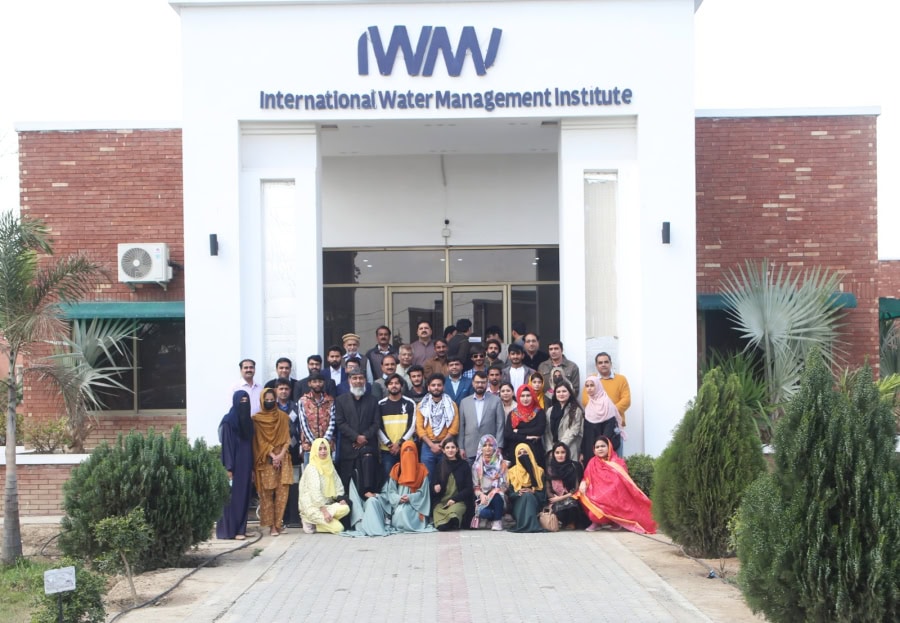OKARA – Experts at the workshop emphasized the importance of effective water management through water accounting, which is crucial for ensuring water availability in various sectors, especially the agricultural industry in Pakistan.
The International Water Management Institute (IWMI) Pakistan organized a workshop to raise awareness among local print, electronic, digital media journalists, and media students about water governance in the country. The workshop’s objective was to assist media professionals in reporting more effectively on water governance, said a press release issued by IWMI on Saturday.
Dr. Muhammad Arshad, the Deputy Country Representative of IWMI Pakistan and the WRAP Programme Component 1 team leader CRS-IWaG, has stated that IWMI is currently working on numerous water-related reforms through the UK Aid-funded programme. These reforms include water accounting and water resources assessment, Data as a Service (DaaS), water allocation systems, groundwater management information systems, and irrigation demand management.
He added that these reforms will enhance water governance in the Indus Basin and support the implementation of national policies on water and climate change. They will also promote sustainable water use in Punjab to comply with the Punjab Water Act 2019.
Additionally, divers have been installed in 300 tube wells across the Okara district to read the water level. As a result, there is no longer a need to visit the field to obtain this data. Instead, the data can be accessed from anywhere worldwide by connecting to the internet.
He said groundwater resources have been monitored routinely, and the data collected shows a decline due to inefficient use in previous years. Farmers in Pakistan rely on apparent soil conditions for irrigation instead of adopting modern techniques and scientific methods. This has resulted in lower production compared to neighbouring countries, Dr Arshid lamented.
Engr. Habibullah Bodla, technical advisor IWMI, also a former chief irrigation engineer in Lahore, aims to extend support to the government to improve water-use efficiency and increase agricultural productivity.
Bodla expressed concern over inefficient use of water techniques in agriculture, saying it not only poses threat to water resources but also damage the crop yield silently. “Excessive use of water doesn’t mean you will get more yield,” the expert broke the myth that most farmers believe.
He said most farmers stick to the ancestral irrigation approaches, a significant barrier to adopting scientifically based sustainable agriculture practices.
Kanwal Waqar, Researcher, Gender and Youth Specialist, also briefed participants on water governance reforms piloted through the WRAP Programme Component 1: CRS-IWaG.
The reluctance was also faced by IWMI advocates in Okara, a city in Punjab where the organisation runs its pilot project with a combination of research and modern instruments, Bodla said.
He said consistency in advocacy for the efficient use of water eventually opened the door to change as Okara-based farmers welcomed the new techniques.
The senior scientist said farmers had admitted that they saw up to a 25% decrease in water use after installing the modern instrument. “Previously, we water the crops 5 to 6 times, but now it is up to four,” he quoted a farmer as having said.
He warned that over-irrigation caused soil salinity that ultimately damaged the yields. He said most of the water used by local farmers without efficient techniques ended up in evaporation, calling it “exporting of water to other lands for free of cost”.
Bodla stressed on resource accounting to gather data about level of groundwater, the water flows in rivers and consumption on routine basis. He said water accounting, a central subject for IWMI, was necessary for efficient use and saving it for future generations.
He said the Punjab government has outlined the water policy that includes water accounting but needs to be implemented in letter and spirit. He highlighted that data-driven allocation and reallocation of water can ensure transparency and efficiency.
Kanwal Waqar, a researcher and gender and youth specialist, provided insights on incorporating a gender perspective throughout the media, from content creation to dissemination.
The workshop focused on the need for gender equality and inclusive media reporting. It provided participants with tools and strategies to incorporate gender mainstreaming principles into their work within the media.
She stressed the importance of adopting a gender-sensitive approach to media reporting to ensure inclusive and unbiased coverage.
Over 50 journalists, including media students, attended a media exposure visit and training workshop. Kanwal added that IWMI Pakistan plans to organize more capacity-building workshops and media exposure visits under the WRAP Programme Component 1.









